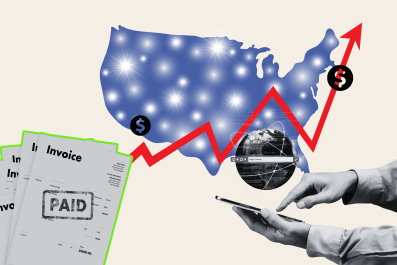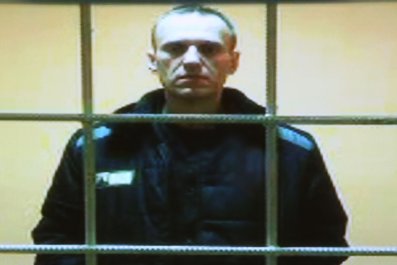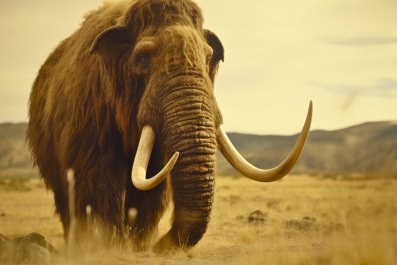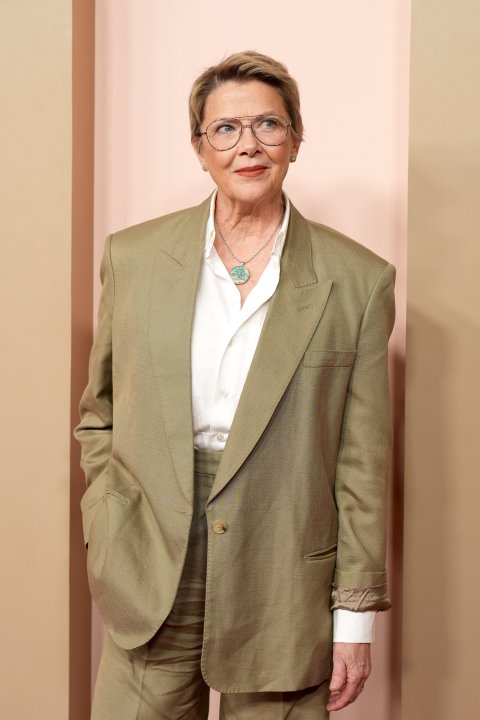
"Right now we all need a certain amount of entertainment. We need a good laugh, we need a good story."
Understanding the balance between dark comedy and mystery is a unique quality of Annette Bening, which she puts to good use in Peacock's limited series Apples Never Fall (March 14), based on Liane Moriarty's book of the same name. "Everybody has a secret, and that's fun." Bening plays Joy Delaney, the matriarch of a seemingly perfect family who suddenly disappears. "Even in the best comedies, there's a deep 'dis-ease' inside of people that we're trying to dramatize." In typical Bening style, she's able to show this dance between genres with such subtlety. "A lot of times in film, the moments that we remember characters are often quiet [ones]." Describing the story as "juicy," Bening says, "right now we all need a certain amount of entertainment." Recently she did just that in the film Nyad, playing the real-life Diana Nyad, who broke records swimming from Cuba to Florida coached by her friend Bonnie Stoll (Jodie Foster). The role earned her an Academy Award nomination. "This idea of chosen family is very familiar to [queer] people. And it's just important that people see that."
SUBSCRIBE TO THE PARTING SHOT WITH H. ALAN SCOTT
ON APPLE PODCASTS OR SPOTIFY
Editor's Note: This conversation has been edited and condensed for publication.
What about the family in this story did you respond to?
Well, one thing I really liked is the writing, because there's a dark humor there. It kind of teeters on comedy and drama all the time. And I really liked that. Sometimes you don't know—wait, is this really funny? Or is this really horrible and sad? Because, of course, those things coexist all the time. I like that about it. It's a kind of delicious, fun problem. Because as you're watching it, you know you're gonna get there somehow and it gets dark, but it never takes you to a dark place that many of the things that I have done have gone to. There's something fun about that. It does have a delicious tone that I wanted to get into. It's not earnest, which I love.
There's also that you keep wondering the motivations behind every character because every single family member seems to have something out for every other family member. It makes you wonder what the hell happened in this family.
Certainly, everybody has a secret, and that's fun. There is a gun in the drawer, as it were, and somebody shows it to you right away. So you sort of know that there was a possibility that things could go in any direction as a viewer, I mean, at least I hope that's what people feel. That's what we're going for, we'll wait [for] who has the secret that's actually going to tell us what is behind what's going on and who is just being a normal person with normal, weird secrets?
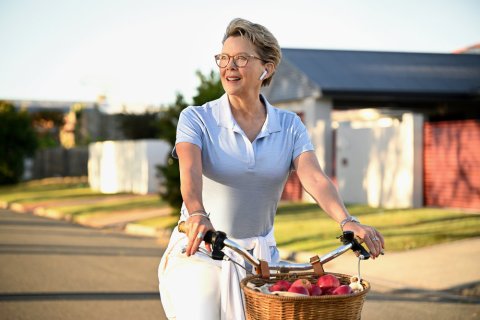
And your character, there's such a balance between she's normal, but you look in her eyes and you know something is going on there. Possibly something sinister. It's so much fun!
I think right now we all need a certain amount of entertainment. We need a good laugh, we need a good story, a good thing that involves us and jettisons us out of our own world and our own issues. Not only that, but the issues of the world around us, which are so grave into something that's just entertaining.
You're so right. Especially with everything happening, a show like this is just so juicy.
Yeah, it's juicy. I love that it is good fun. In some ways, for me, if I watch something that I really enjoy, that is just good entertainment, I can see the world around me in a different way. I can contextualize it in a different way. So maybe that's why, for me personally, why I also need that. Whether it's reading or whether it's a certain show that takes me to a place. And then when I come back to the realities of the domestic political situation in the United States, which is so serious, or what's going on around the world, then I can maybe see it and feel it in a better way.
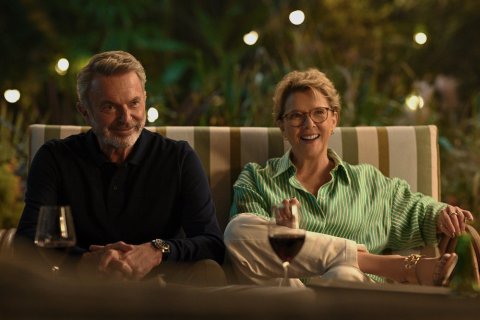
What I love about the women you play, particularly the mothers, there's always something happening with them where you know they're about to break. Something is going to happen. Whether it's American Beauty or The Kids Are All Right. Do you seek out those roles?
I think good writing always has that. Good writing has has an opportunity to look into an inner life of a person. One thing that cameras can do in a way that you can see on the stage, but it's more rare that you see private moments. And we all, of course, live inside our private minds. We also have our daily lives where we're with people, we're interacting, and then we're alone. And in the alone moments, obviously there's no one there and we all live alone inside of our heads. I feel like movies can offer an insight into those parts of ourselves that no one sees. It's like when you read a book and you see something in a book, and you realize, "Oh, I thought that I just thought that or I thought I just felt that, you're telling me a secret I didn't even know I had." So I feel like in good writing like American Beauty, Alan Ball plumbed the depths of that. And I think Liane Moriarty is touching on these kinds of things in her writing too, perhaps in a less serious way. But yet, it's not less serious. It is serious. And any great writing, underneath it, whether it's comedy or something really serious, there's something deep. Even in the best comedies, there's something very deep. There's a deep "dis-ease" inside of people that we're trying to dramatize in order to show the rest of us.
I've seen you on stage, and you're incredible. Do you approach a role differently when it's for stage instead of screen?
It's the same; it's not really different. What's different is the number of times you have to bring a story to life. So the inner work, I think, is very similar. I was talking to somebody the other day, who had never done a play. She had done a bunch of movies, and she described doing a play for the first time and how demanding and different it was, the reason being that, of course, you're living that story every day, some days twice a day. So you're going through the story over and over. You have to find ways of stimulating yourself into the moment that are more varied. Because obviously, if you're only doing a moment or a scene for a day-and-a-half, what you have to draw on to get yourself there is different than when you're doing it every day. And the camera, of course, versus being on the stage is so different. One thing I wanted to mention when we're talking about this is when I was in acting school, we did something called a private moment. This was early in the training, where you're asked to, when you're at home, do something that you do when you're only alone. Like maybe somebody puts on a symphony, and they're doing the conducting of something that you would never do if somebody was watching you, because you would look foolish.
Oh, my boyfriend does that. It's his dance move. Just stands there, bopping up and down, acting like he's conducting an orchestra.
Well, that's probably the sign of a good relationship. [But] you get the idea. They were trying to draw out of us this awareness of what we do when we're alone and how that can be useful in terms of acting. And I remember the exercise and I remember certain people doing the exercise. I remember one guy, they were very critical of him, because he was sort of posing, and he got out of book and he was sort of reading aloud and you didn't buy that it was private, because actually, it's very hard to do. So the exercise was that you find five minutes where you're doing that at home, and then you bring it into class and you show it. It was a very useful thing to think about. And a lot of times in film, the moments that we remember characters are often quiet, they're not really saying anything. They may be receiving some information from someone else, or they might just be by themselves experiencing something.
What I find so interesting about that is you as the actor, and as a producer of this project, you know exactly where the story is going, you know how it ends. So how do you, in the moment, not let that knowledge impact how you react or let it read?
That's a good question. It is sort of the central task. And of course, you have your own brain that's talking to you because if you didn't, you would be psychotic. This is pretend, this isn't you, this moment that you're in isn't actually real. But the immersion and the level of immersion that you can find is sort of the icing on the cake. There are a few moments in my entire career that I can think of where I felt completely free and immersed in a moment, I mean really immersed without feeling insane, but just feeling free. Probably more than a few, there have been a number, but that's kind of what you're going for. But most of the time you're not there, there is a brain and there's doubt, and there's fear and insecurity. And there's the laundry list, and there's your children at home, and there's your mother and your dad passed away. You're tired, or you're sick, or you have a headache, or all of the things that happen. A lot of acting schools talk about, and Uta Hagen—who was one of the great acting teachers and wrote a great book about acting called Respect for Acting—says, "use it." Whatever is going on in your real life can be used as fuel for the moment that you're in as an actor. I like that idea because then everything gets poured into it. But dealing with fear, insecurity, doubt and distractions. That's a really good one to talk about, because for me, what I try to do is just say, "Yeah, I'm scared. I'm nervous right now. I'm aggravated at that other person, or I'm too exhausted to do this," or whatever that's going on. I try to just accept, acknowledge it and say, "Oh, yeah, that's what I'm actually feeling."
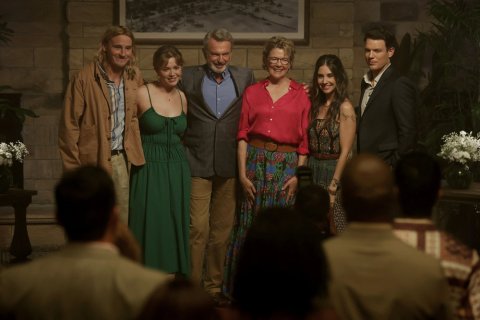
Did the success of Big Little Lies impact your decision to do this?
Because of the quality of the acting, too. When I look at some of the performances, in her writing there is an inherent theatricality. That just means that she puts into life the stuff that's going on, and in the hands of good actors, that can be really fun to watch and can be really engrossing. So it definitely informed that and just talking to the showrunner, Melanie Marnich, who had already been working on it for quite a long time. She was just so steeped in it, and also completely articulate, which kind of blew me away that she was able to describe everything and talk about what was important to her and what were the underpinnings. She was very responsive to creative questions. I like that. I like being challenged. When you start digging a bit deeper, which is what she was doing, then that's where the gold is. That's where the fun is.
Congrats on your Oscar nomination for Nyad. How does it feel to be in this moment with this film?
It's really exciting. And the fact that Jodie [Foster] and I are in this together, because we didn't know each other when we started. I was so grateful that she did the movie. The minute she signed on I felt like, "Okay, now I know we have a movie," because she has such gravitas and she's so smart, and she just had so many good ideas. We just got on very, very well, and we've become friends. So that is a thrill.
And also Diana [Nyad] and Bonnie [Stoll] are such characters. They're such wonderful women. For instance, yesterday, Diana sent me a picture of the two of them. They play tennis now obsessively, like they play every day. And they compete, of course, and won the trophy for their age group. They sent it to our group chat. These queer women, they're now in their 70s, and there's something really important about that, just acknowledging and seeing these women doing things that we don't imagine women of that age doing, and certainly, maybe even more, queer women of that age do. So it expands our brains. Like we have these certain unconscious assumptions about people, we all do it, it's just human. And then when something happens, it's like, oh, we're seeing people in a different way.
I was listening to Tracee Ellis Ross talk about her movie this year, American Fiction, and she was talking about how we don't normally see people of color sitting and having the situations that they're having in that movie. And I thought that's so true. That's so smart. And in a way, I think Nyad has a certain amount of that, too. A little girl wrote me a note, she went to a screening the other night, and she just wrote me this note, "I really liked the movie. And I like how hard you worked." And I just thought, "Oh, that's so cool." This little girl gets to look up at these women and say, "Oh, that's what it's like to be 60-something and to want something really badly and to try really hard and to have a really good friend who helps you."
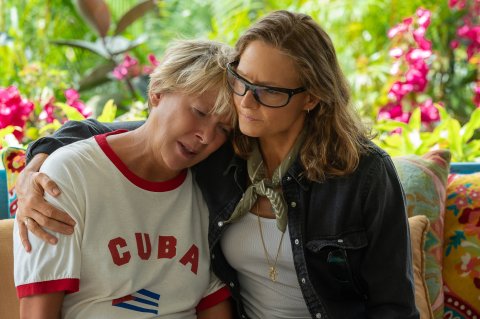
There's also that element of refining what "family" means. That's two women, best friends but unmarried with no children, yet they're just as much a family as any typical nuclear family.
Yeah, and I think, from my direct experience with my friends, my kid, from friends of mine, but many queer people are estranged from their families because their families don't accept them. So this idea of chosen family is very familiar to people in that world. And it's just important that people see that. And the fact that they once did date, years ago, and that's also really, really common, so I like that we're showing that without having to talk about it too much. It's just inherent in the story.
One thing I have to tell you, many of us are very angry you've never won an Oscar. Are you aware of how angry we are?
No, I didn't know you were angry. I'm so pleased you're furious. [laughs] Thank God. I want you to just stay mad. [laughs]
I wanted to ask you about your work with the Entertainment Community Fund, previously known as the Actors Fund. What are you up to now and how can people become more involved?
I really appreciate that. So, first of all, let me say we recently changed our name. And the reason that we did that was because we have been known as the Actors Fund for 140 years, and a lot of people know us by that name. And we really had to think about it carefully because we love that name. The problem was, as our mandate expanded, people thought we were just for actors. And so we constantly had to remind people, no, we're not just for actors. We're for everybody in show business.
We ended up actually changing our name to the Entertainment Community Fund recently. And what we do is we're a social services organization for everybody in show business, that's everybody. You can be an usher in a theater, you can be the guy that runs the spotlight, you can be an actor, you can be a dancer, choreographer, producer, director, grip. So everybody in front of or behind the camera and the curtain. We do as much housing as we can. We just built a new apartment building in the middle of Hollywood that is dedicated to artists and it's low-income housing. We do health care, and we do health insurance counseling to help people get and maintain health insurance. One of the big things that happened during the pandemic was that everybody was out of work. So we started a work stoppage fund. It's an emergency assistance fund we've always had, but we raised a tremendous amount of money. It became a kind of hub, because it was an easy place to go and apply for money. So a lot of people gave us money, including the Academy of Motion Picture Arts and Sciences and the showrunners and the stagehands union, all of us got together and pooled the money and gave it out. The same thing happened during the strike. We had a work stoppage fund, because, as I'm sure you know, it was devastating economically to a lot of people, not only the people on strike, the writers and the actors, but all the ancillary people that work with us. So we tried to raise as much money as we could to help people. It's not everything, but it's something. It was enough money for some people to just pay their rent for one month, or get their medical bills paid, or get their electricity bill paid. And I love the work that we're trying to do together. It's a big team effort. And what's more fun than being amongst a group of people that you love and admire and you have a common purpose?




